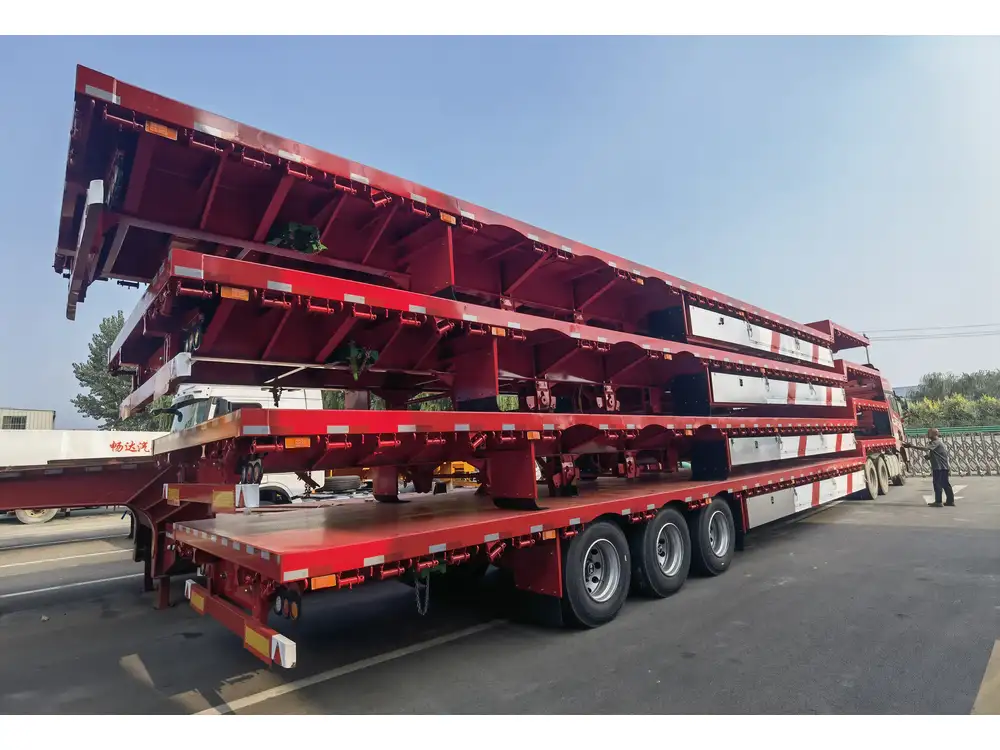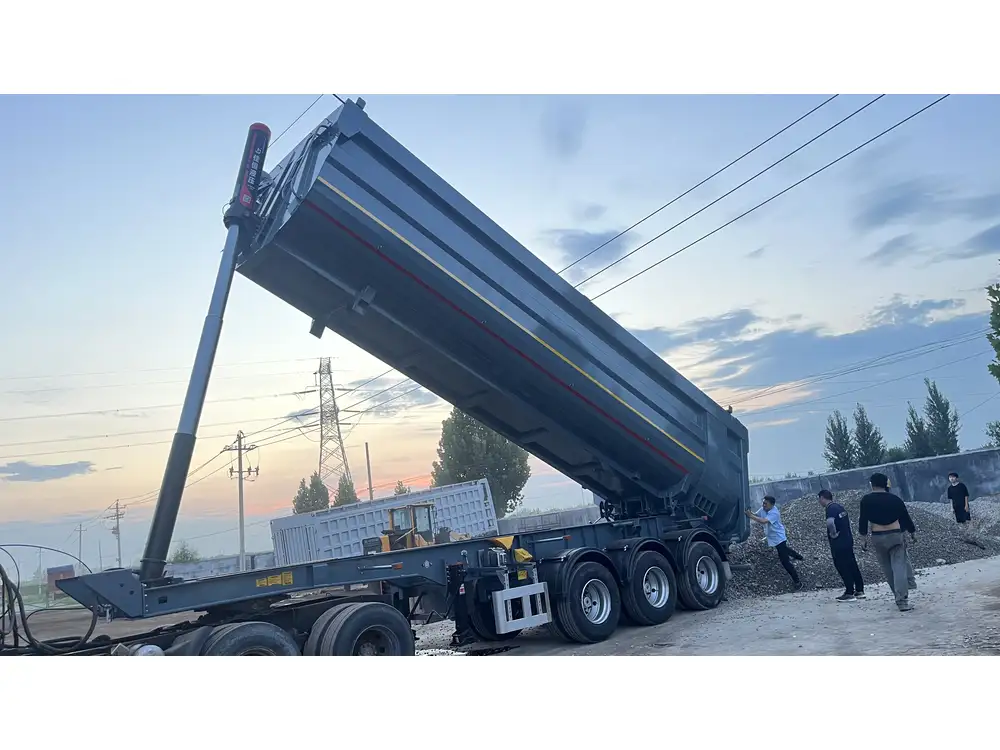Dump trailers are invaluable assets in the world of heavy-duty hauling, construction, and landscaping. They are designed with robust mechanisms that allow for quick unloading of cargo. One crucial component that plays a vital role in the functionality of dump trailers is the hinge. Not only does it facilitate the movement of the trailer bed, but it also ensures stability and strength during the lifting process. In this guide, we’ll delve into the intricacies of creating dump trailer hinges, providing you with detailed insights, practical tips, and expert considerations.
Understanding Dump Trailer Hinges
What Are Dump Trailer Hinges?
Dump trailer hinges are mechanical devices that connect the trailer bed to its frame, allowing the bed to pivot when tilted. This pivot action is essential for unloading cargo efficiently. A well-constructed hinge will withstand heavy loads, resist corrosion, and require minimal maintenance.

Types of Hinges Used in Dump Trailers
| Hinge Type | Description | Applications |
|---|---|---|
| Piano Hinges | Long continuous hinges that provide uniform support | Ideal for heavy-duty trailer beds |
| Pin Hinges | Compact hinges that rely on a central pin | Used in smaller trailers |
| Butterfly Hinges | Wide flaps that increase stability | Perfect for wider trailer beds |
Materials Required for Making Dump Trailer Hinges
The choice of materials is paramount in hinge construction. High-quality materials enhance durability and functionality. Below is a list of materials typically used for producing dump trailer hinges:
Essential Materials
- Steel Plates: Provides the backbone of the hinges, necessary for strength and rigidity.
- Stainless Steel Pins: Resistant to rust and corrosion, ideal for outdoor use.
- Bushings: Facilitates smooth movement between components.
- Welding Rods: Essential for joining steel parts together.
- Rust Inhibitor Coating: To protect the finished hinge from environmental damage.

Tools Required
List of tools that are vital for the hinge-making process:
| Tool | Purpose |
|---|---|
| Welding Machine | For forging the hinge parts together |
| Angle Grinder | To cut and shape steel plates |
| Drill Press | For precision drilling of holes for pins/bushings |
| Measuring Tape | To ensure accurate dimensions |
| Safety Gear | Including gloves, goggles, and ear protection |
Step-by-Step Process to Make Dump Trailer Hinges
Step 1: Design Planning
Before starting the fabrication process, sketch a detailed design of your hinge system. Determine the necessary specifications, such as load capacity, dimensions, and pivot points. Consider the following:
- Load Requirements: Assess the maximum weight the hinge will support.
- Angle of Tilt: Define how far the trailer bed will tilt during unloading.

Step 2: Material Preparation
- Cutting Steel Plates: Using an angle grinder, cut the steel plates to the required dimensions based on your design plan. Ensure edges are smooth to prevent injury during assembly.
Step 3: Drilling Holes
- Drill Pin Holes: Utilize a drill press to make precise holes in each plate for the pins and bushings. Ensure that the holes align perfectly; misalignment can result in malfunction.
Step 4: Assembling the Hinge

4.1 Welding Components
- Join the Plates: Using a welding machine, carefully weld the steel plates together, maintaining a consistent angle for strength. Allow the welds to cool completely before proceeding.
4.2 Installing Pins and Bushings
- Insert Bushings: Carefully install bushings into the drilled holes. These bushings will ensure smooth rotation.
- Add Pins: Insert stainless steel pins through the bushings, securing the hinge’s movement.
Step 5: Surface Treatment
- Rust Inhibitor Coating: Apply a rust inhibitor coating on the finished hinges to enhance durability against environmental conditions. This step is crucial for maintaining the longevity of your hinges.

Testing the Hinges
Once your hinges are fully assembled, it is crucial to perform thorough testing to ensure they function correctly:
Load Testing: Apply a load on the trailer bed and test the hinge operation. Ensure that it can handle its designated capacity without any signs of strain.
Movement Smoothness: Check the pivot action of the hinges. They should rotate smoothly without any sticking or excessive resistance.
Physical Inspection: Look for any weld fractures or misalignments. Address any concerns before putting the trailer into operational use.
Maintenance Tips for Longevity
After investing time and resources into creating your own dump trailer hinges, it’s essential to implement a maintenance routine to ensure they remain in peak condition over time. Here are some practical maintenance tips:
Regular Inspection
- Inspect hinges routinely for signs of wear and tear, including rust or loose fittings. Promptly address any issues to prevent further damage.

Lubrication
- Apply high-quality lubricant to the pins and bushings periodically. This helps maintain smooth operation and prevents rust formation.
Cleaning
- Clean the hinges regularly to remove debris and dirt that can contribute to wear. A clean hinge operates more effectively and lasts longer.
Common Issues and Solutions
| Issue | Symptoms | Solution |
|---|---|---|
| Rust Formation | Visible rust on hinge components | Apply rust inhibitor coating and store trailer indoors when not in use. |
| Worn Pins | Loose or wobbly hinge movement | Replace pins and inspect bushings for wear and tear. |
| Misalignment | Hinges do not move smoothly | Re-drill pin holes or adjust hinge alignment during installation. |

Conclusion
Creating dump trailer hinges requires careful planning, the right tools, and quality materials. By following this comprehensive guide, you will not only develop a robust hinge system but also ensure its longevity through proper maintenance. As you embark on this project, consider the unique requirements of your trailer and the loads it will carry. Empower yourself with knowledge, and harness the capability to fabricate high-quality hinges that enhance the performance and efficiency of your dump trailer.
With the right preparation and execution, these hinges can significantly improve your hauling operations, allowing you to tackle any job with confidence. Whether you are a professional manufacturer or a DIY enthusiast, mastering the art of producing dump trailer hinges will undoubtedly serve you in myriad ways, paving the path to successful spending in the heavy-duty transport industry.



